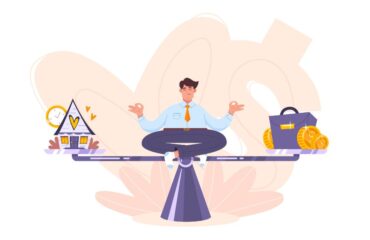As per a report, 70 percent of Indian employees working in the corporate sector experience stress during work at least once every week. This shows how workplace stress has become a common concern faced by many. What exactly is work-related stress, though?
Psychologists define stress as any circumstance that threatens one’s well-being and thereby taxes the person’s ability to cope. Thus, job stress can be understood as the physical, mental, and emotional hardships experienced by working individuals as a result of pressures and demands from their work. This happens when the requirements of a job exceed the person’s ability to keep up with them. Some of the most common sources of job-related stressors are-
- Demands of a task or excessive workload
- Responsibility over people’s lives- Professionals like doctors and firefighters encounter several challenging situations at work where even the slightest mistake they make can endanger someone’s life.
- The physical environment of a job like extreme noise, pollution, uncomfortable chairs, etc.
- Lack of growth opportunities at work and insufficient control over certain aspects of the job
- Strenuous interpersonal relationship with coworkers
- Unfair treatment at the job or unequal advancement and promotion
- Fear of getting laid off and job uncertainty
Why Is Coping With Work-Related Stress Important?
Working in a stressful environment can take a toll on your physical and mental well-being. Pressures from work can lead to acute symptoms like headaches, and even long-term effects like sleep disturbances, lowered performance, and difficulty in achieving a work-life balance. People who experience severe distress regularly are also more prone to experience psychological issues like depression and decreased life satisfaction.
Prolonged forms of work-related stress can even lead to a state of exhaustion or, in other words- work burnout. It is not just a feeling of stress but a complete breakdown of one’s resources to fight against the stressors. The saying prevention is better than cure holds significant meaning in this situation, suggesting that timely measures can help you cope with the pressures of the workplace and avoid burnout.
9 Techniques To Effectively Manage Work-Related Stress
A certain level of pressure from your work demands is natural and might even motivate you to work harder. However, when the stress starts to interfere with your functioning and affects your performance, here are some simple strategies that might help you deal with it:
- Identify Your Stressors: before you move on to deal with the effects of stress, it is important to identify which situations cause you the most stress. Instead of avoiding these, it can be helpful to understand how stressful circumstances make you think and act. You might notice certain patterns in your coping behaviours that fuel the stress instead of reducing it. Ask yourself questions like – Why am I feeling stressed? Do my behaviours fuel or reduce stress? Do I need a break?
- Establish Boundaries: the fast-paced contemporary world has made it almost impossible to separate your work and personal life. If you find yourself constantly worried about work, even beyond working hours, you might want to recheck the boundaries you have created between your personal and professional life. To know more about how blurred work-life boundaries can impact your well-being, check out our blog “Setting Boundaries: Establishing Work-Life Balance for Stress Reduction.”
- Seek Support: Spending some quality time with a friend or family member after a long, busy day might be just the thing you unburden some of the load. Dealing with stress alone can be very exhausting. Seeking professional help can assist you in addressing the problems you face at work and finding the strategies that work for you.
- Proactively Strategize: if you often feel overwhelmed by tasks and feel an excess load, planning in time will help prepare you to deal with task demands. Being organized will give you a sense of increased control over your job, and you will be able to better manage challenges when they present themselves. Thinking ahead involves managing your time effectively, bringing your skills to the best use, and avoiding procrastination.
- Prioritize Self-Care: what does your self-care routine look like? Taking out a couple of minutes regularly for yourself can do wonders for your mental health while simultaneously improving your productivity. Take care of your body and mind through exercising, meditation, socializing, engaging in hobbies like dance or painting, or anything else that you enjoy doing.
- Conflict-Resolution Strategies: many people report that a lot of the stress that comes from the workplace is due to conflict with coworkers. When working as a team, it makes more sense to have a harmonious relationship with your team members. Cultivating a positive workplace culture promotes both employee well-being as well as performance. Doing your part in creating a supportive work environment will come back and help you too. You can learn conflict-resolution strategies from experts and implement them in your workspace to create and foster healthy relationships.
- Let Loose: apart from external stressors, many people put a lot of pressure on themselves in their pursuit of being perfect at everything they do. Perfectionism can be good for your professional life in the short term, but if you end up scrutinizing all your moves, you might be no help to anyone. Put your best efforts in and reward yourself for the same. Avoid the vicious cycle by comparing all your results to your best result.
- Take Breaks And Relax: taking mini-breaks in between work can help recharge your energy. Working 4-5 hours straight with lethargy is bound to be less productive than taking a couple of minutes off to relax after every hour you work. Perceive these breaks as refuelling time rather than time off work. Take a walk, listen to music, talk to a friend.
- Communicate Your Concerns: if you have been feeling stressed at work, talking openly about your concerns with your supervisor in a constructive way can help you both meet in the middle, where the boss’s demands are met, not at the cost of your mental health. After all, a happy employee is a productive employee.
You might not be able to gain full control over external stimulators, but the good news is that you can alter your perceptions of stress as well as the emotions that come with it. Do more of what helps you and find your balance by using a combination of these strategies. Wishing you stress-free work life(or the strength to cope with it)!





